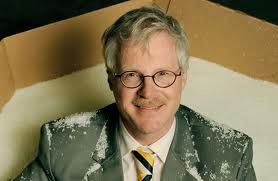‘We passed the 400 ppm CO2 mark in the air this year, and it will not stop there. To put things into perspective: in 1960 we passed the 300 ppm level. What should we do now? Produce virtually CO2-free products. For instance, biopolymers like PLA. And impose a tax on products that do not comply to this standard, in order to stimulate CO2-free purchases.’

Often, consumers are eager
‘Government did a good job in promoting energy efficient cars,’ says Jan Noordegraaf, CEO to Synbra Technology, the Dutch producer of biopolymer PLA, used among others for production of the insulation material BioFoam. ‘So use taxation in a responsible way, raise it a little here and a cut it little there – that is the way to promote the build-up of a new low-CO2 economic sector.’ Such taxation schemes can even be too successful, like the promotion of energy efficient cars in the Netherlands and locally produced electricity in Germany. Often, consumers are eager, in particular if they see a profit and if government gives some support by little tax cuts.
‘For the time being, bioPE and bioPET are the most important biopolymers,’ says Jan Noordegraaf, ‘but PLA is by far the most sustainable and the most efficient. BioPE needs twice the amount of sugar compared to PLA. PLA capacity has grown a lot, but the market has not yet quite responded. The market breakthrough is stalled by the price (fossil polymers cost some € 1,50 to € 2,- per kilo, biopolymers are € 0,50 to € 0,80 more expensive); and there are some supposed ‘issues’. Like: availability, labelling, uncertainty about shelf life, and questions about composting. Although we can answer all these questions satisfactorily, packaging industry still does not really want to listen. However, there is a proven threefold reduction in CO2 emissions in biopolymer production as compared to fossil polymers: 800 kg CO2 for production of one ton PLA, compared to an average of 2 725 kg for fossil polymers. In spite of those differences, there is no level playing field yet.’
But price is the only thing that counts for industry
The only thing that counts in the world of polymers these days is price. Low carbon emissions, however impressive, are unimportant in practice. Sweet talking about the green side of the material does not have any impact. That is why production of PLA and other biopolymers still is much too low. Jan Noordegraaf envisages however that they can be promoted by smart taxation. He proposes to impose a tax of one Eurocent per kilo of fossil polymer, and reduce packaging tax for biopolymers by € 0,50 to € 0,80 (i.e. the price difference between bio and petro). And subsequently decrease that reduction in proportion of the growth of biopolymer production. Taking into account the volumes of materials produced, this scheme is budget neutral for government.
Therefore, Jan Noordegraaf’s message to government is: ‘do what you are good at, raise extra taxes for the fossil-based polymers, and compensate biobased polymers with the revenues from that scheme, just like you did with energy efficient cars. And in doing so, prepare the ground for a growth in industry by which it can match the size of fossil polymers.’
